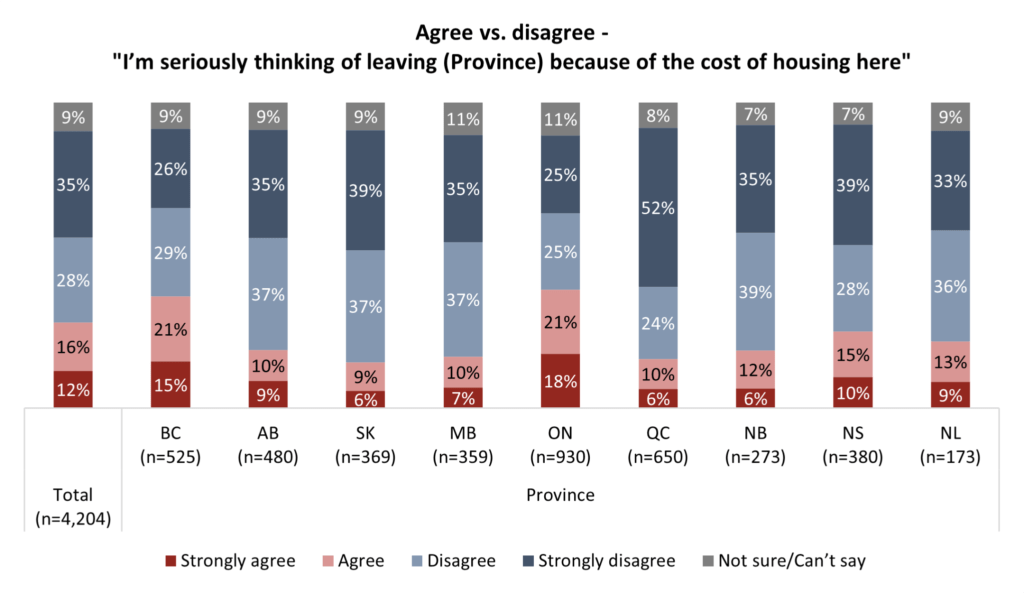AI Generated Summary
- The dream of owning a home, a cornerstone of the Canadian promise, is slipping away for many, turning the dream into a nightmare, especially for recent immigrants.
- Canada, a land synonymous with opportunities, diversity, and a welcoming spirit, is now grappling with a housing affordability crisis so severe that it is driving residents to consider leaving not just their cities, but the country itself.
- The situation is even more dire in urban centres like the Greater Toronto Area (GTA) and Metro Vancouver, where nearly half of the residents are contemplating a move.
Canada, a land synonymous with opportunities, diversity, and a welcoming spirit, is now grappling with a housing affordability crisis so severe that it is driving residents to consider leaving not just their cities, but the country itself. This alarming trend is particularly pronounced among recent immigrants, who came to Canada seeking a better life but are now disillusioned by the harsh realities of an unattainable housing market.
A survey by the Angus Reid Institute (ARI) reveals that nearly 28% of Canadians are seriously considering relocating due to the exorbitant costs of housing. For those who have lived in Canada for less than a decade, this figure soars to 39%. The situation is even more dire in urban centres like the Greater Toronto Area (GTA) and Metro Vancouver, where nearly half of the residents are contemplating a move. Toronto stands out with 44% of respondents considering leaving, and in Metro Vancouver, one-third are uncertain if they can continue calling it home.

The ARI’s findings are stark: shelter costs are the primary driver of this internal migration. Mortgage holders and renters alike are feeling the squeeze, forcing many to look towards more affordable provinces like Alberta. Yet, an even more troubling statistic emerges from the survey: 42% of those seeking new homes are contemplating moving abroad. Countries like the United States are seen as viable alternatives, with nearly 12% of Canadians considering leaving the country altogether.

This mass exodus is not just a reflection of high housing costs; it’s a potential brain drain that could have long-term repercussions on Canada’s economy and societal fabric. The dream of owning a home, a cornerstone of the Canadian promise, is slipping away for many, turning the dream into a nightmare, especially for recent immigrants. The number of Indians, who form the largest group of new permanent residents, has surged since 2013, yet many are now contemplating leaving due to unaffordable living costs.
In October, a survey by Ekos found that 44.5% of Canadians believed there were too many immigrants, citing the lack of affordable housing as their main concern. This sentiment marks a dramatic increase from a 30-year low of 14% in February 2022. The rapid rise in rental inflation, hitting 7.8% in the final quarter of last year, exacerbates this issue, making it increasingly difficult for both new and established residents to find affordable housing.
Canada’s reputation as a haven for newcomers is at stake. The high cost of living is forcing many recent immigrants to leave, which could tarnish the nation’s image as a welcoming and inclusive society. Data from Immigration, Refugees and Citizenship Canada (IRCC) in November 2023 shows that 62,410 international students and graduates became permanent residents. However, if the trend of departure continues, Canada risks losing the very people who enrich cultural heritage and drive economic growth.
Within Canada, provinces like Alberta and regions in Atlantic Canada are seen as potential refuges, with 18% and 10% of those considering moving within Canada looking at these areas, respectively. However, the challenge remains: can these regions absorb the influx and provide the opportunities that residents seek?
Urban centres like Toronto and Vancouver face the looming risk of losing the workforce needed to keep their city cores vibrant and thriving. The Institute for Canadian Citizenship reports a worrying trend: fewer permanent residents are becoming citizens, dropping from 75% in 2001 to just 45% in 2021. This decline indicates a growing disenchantment with the Canadian dream.
Canada stands at a crossroads. Addressing the housing affordability crisis is not just about economics; it’s about preserving the essence of what makes Canada a beacon of hope and opportunity. Leaders must act decisively to make housing more affordable, ensuring that Canada remains a land where dreams are not just dreamt but achieved. The future of Canada depends on it.
The opinions expressed in this article are those of the author. They do not purport to reflect the opinions or views of Khalsa Vox or its members.




